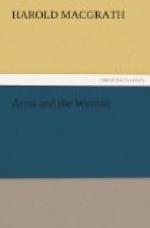“Come and sit down,” said she, making room for us. “I have had a curious adventure.”
“Tell us all about it,” said Pembroke.
“I have had the honor of being mistaken for a Princess,” triumphantly.
“Who could doubt it!” said I, with a glance I could not help, which made her lower her eyes.
“Moreover,” she continued, this time looking at Pembroke, “the gentleman who committed the error was the Austrian Ambassador. What a compliment to take home!”
“And who was the Princess?” I felt compelled to ask, though I knew perfectly well.
“The Princess Hildegarde. Do you recall the night in London,” to me, “when the same thing occurred? I am very anxious to meet this Princess who looks so like me.”
“You will have that pleasure immediately after the opera,” said I.
Pembroke’s eyes said something to me then, and I rose.
“There is Mr. Wentworth. I wish to speak to him. Will you excuse me?”
“With pleasure!” laughed Pembroke.
I threaded my way through the gathering throng to the side of Mr. Wentworth.
“How d’y’ do, Winthrop?” he said, taking me by the arm. “Come into the conservatory. I want you to see some of the finest orchids that ever came from South America. The girls are looking well to-night. I suppose you noticed.”
“Especially Phyllis.” Our eyes met.
When we entered the conservatory, he suddenly forgot all about the orchids.
“Jack, I’m worried about her—Phyllis. You see, she is not my niece. There’s a long story, This morning a gentleman visited my department. He was Prince Ernst of Wortumborg. He began by asking me if Phyllis was my niece. That started the business. He proceeded to prove to me, as far as possible, that Phyllis was a Princess. I could not say that it was all nonsense, because I did not know. Some twenty years ago, a strange thing happened. I occupied the same residence as to-day. It was near midnight, and snowing fiercely. I was looking over some documents, when the footman came in and announced the presence of a strange woman in the hall, who demanded to see me. The woman was young and handsome, and in her arms she carried a child. Would I, for humanity’s sake, give a roof to the child till the morrow? The woman said that she was looking for her relatives, but as yet had not found them, and that the night was too cold for the child to be carried around. She was a nurse. The child was not hers, but belonged to a wealthy family of the south, who were to have arrived that day, but had not. The thing seemed so irregular that I at once consented, thinking to scan the papers the next day for an account of a lost or stolen child. She also carried a box which contained, she said, the child’s identity. Now, as I am a living man, there was nothing in that box to show who the child was; nothing but clothes, not a jewel or a trinket. I looked through the




